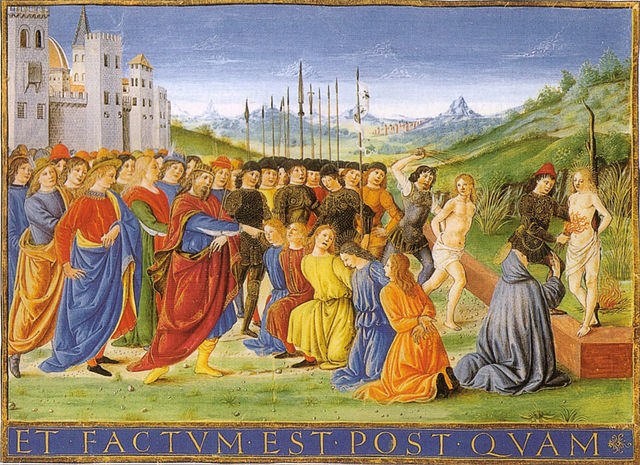rakovsky
Well-known member
For Daniel 10, I read the DSS Bible, DSS English Bible, KJV, NET with Constable's notes, Synodal, NETS, the first and only two pages of the S.R.I.'s "Chapter 11", Brenton LXX, Church Slavonic, and OSB translations. I've been doing this with Daniel 1-9 as well.
Daniel 10:14's ending comes off a bit confusing in the NET's notes, as to whether it says "days" or "days to come", although the natural sense is the latter.
The Hebrew says:
"Now I have come to make you understand what will happen to your people in the latter days, for yet the vision to days."
This last phrase לימים / layyamin shows up in Ezekiel 22:14:
"Can thine heart endure, or can thine hands be strong, in the days (לַיָּמִ֕ים / lay-ya-mim) that I shall deal with thee? I the Lord have spoken it, and will do it."
The key word here is (יוֹם "yom"), meaning "day".
The KJV has for Dan. 10:14:
It seems that the NET version interprets the literal phrase "for yet the vision to days" to mean "for the vision [relates to / is for] days yet [to be]."
That is, the NET takes the word "yet" to mean that the days are "yet"/"still" to be, and it interprets the word "to" to mean "for", and it sees the words "is" and "to be" as implicit. This seems like the most reasonable interpretation to me.
Theodotion's Greek version apparently uses a rather literal translation into Greek, as does the Old Greek Version. Here is the NETS translation of those two Greek versions:
I also considered other potential ancient texts related to Daniel.
Archaeologists found an ancient artifact in Ugarit with a Canaanite legend from before Moses' time about "Danel" and his son Aqhat. I read a copy of the text.
The name "Daniel" also comes up in 1 Chron. 3:1 as a name for David's second son, Daniel, by Abigail. In 2 Sam. 2:3, David's second son, by Abigail, is named Chileab.
In Ezekiel 14 and 28, Ezekiel refers to both "Danel" and "Daniel", using both spellings, and it's not obvious whether Ezekiel is referring to the ancient Canaanite "Danel," to the 6th century Jewish exile in Babylon named "Daniel," or to both. My impression is that Ezekiel is alluding to both figures. I made a thread about it here:
The Dead Sea Scrolls have both such Biblical references to Daniel, as well as a few nonBiblical stories likely related to him.
1st Enoch has a character named Daniel and the 7 year cycle concept. The books of the Maccabees make reference to Daniel, as do the NT and Josephus. I imagine that early Church Fathers and Rabbinic writings also refer to Daniel.
The name Daniel also comes up in Ezra 8:2 and Nehemiah 10:6 regarding the period soon after the end of the Babylonian exile. Ezra 8 gives a list of priests returning from Babylon to Judah, and "Daniel" is the name of a returning priest descended from Ithamar, Aaron's younger son. In Nehemiah 9-10, leaders of Judea, including one named "Daniel" made and sealed a covenant with the Lord.
Kingston Tong proposes that Daniel might have returned from exile to Judah with Zerubbabel in 537 BC, but that the time of the return of the group of exiles in Ezra 8:2 and Nehemiah 10 would have been after the prophet Daniel's lifespan:
Daniel 10:14's ending comes off a bit confusing in the NET's notes, as to whether it says "days" or "days to come", although the natural sense is the latter.
The Hebrew says:
This literally runs:ובאתי להבינך את אשר־יקרה לעמך באחרית הימים כי־עוד חזון לימים׃
וּבָ֙אתִי֙ / ū·ḇā·ṯî / Now I have come | לַהֲבִ֣ינְךָ֔ / La-Ha-bineka / to make you understand | אֲשֶׁר־ אֵ֛ת / Et (preposition marking an object)
אֲשֶׁר־ / Asher / what | יִקְרָ֥ה / yiqrah / will happen | לְעַמְּךָ֖ / Le-ammeka / to your people | בְּאַחֲרִ֣ית / Be-aharit / in the latter
הַיָּמִ֑ים / hay·yā·mîm / days | כִּי־ / ki / for | ע֥וֹד / owd / yet | חָז֖וֹן / ḥā·zō·wn / the vision | לַיָּמִֽים׃ / lay·yā·mîm / to days
"Now I have come to make you understand what will happen to your people in the latter days, for yet the vision to days."
This last phrase לימים / layyamin shows up in Ezekiel 22:14:
"Can thine heart endure, or can thine hands be strong, in the days (לַיָּמִ֕ים / lay-ya-mim) that I shall deal with thee? I the Lord have spoken it, and will do it."
The key word here is (יוֹם "yom"), meaning "day".
The KJV has for Dan. 10:14:
The NET version has:Now I am come to make thee understand what shall befall thy people in the latter days: for yet the vision is for many days.
Now I have come to help you understand what will happen to your people in future days, for the vision pertains to days to come.[33]
[33] Translator's Note: Heb “days.”
It seems that the NET version interprets the literal phrase "for yet the vision to days" to mean "for the vision [relates to / is for] days yet [to be]."
That is, the NET takes the word "yet" to mean that the days are "yet"/"still" to be, and it interprets the word "to" to mean "for", and it sees the words "is" and "to be" as implicit. This seems like the most reasonable interpretation to me.
Theodotion's Greek version apparently uses a rather literal translation into Greek, as does the Old Greek Version. Here is the NETS translation of those two Greek versions:
Theodotion's Version
"...and I have come to instruct you about what will meet your people at the end of days, because the vision is yet for days."
Old Greek Version
"And he said to me, 'I have come to explain to you that it will come upon your people at the end of days, for a vision is yet for days."
I also considered other potential ancient texts related to Daniel.
Archaeologists found an ancient artifact in Ugarit with a Canaanite legend from before Moses' time about "Danel" and his son Aqhat. I read a copy of the text.
The name "Daniel" also comes up in 1 Chron. 3:1 as a name for David's second son, Daniel, by Abigail. In 2 Sam. 2:3, David's second son, by Abigail, is named Chileab.
In Ezekiel 14 and 28, Ezekiel refers to both "Danel" and "Daniel", using both spellings, and it's not obvious whether Ezekiel is referring to the ancient Canaanite "Danel," to the 6th century Jewish exile in Babylon named "Daniel," or to both. My impression is that Ezekiel is alluding to both figures. I made a thread about it here:
- "Danel"/Daniel in Ezekiel 14 & 28
A little puzzle in Ezekiel shows up in Ezekiel 14 & 28 when Ezekiel refers to "Danel"/Daniel. The issue is whether Ezekiel's "Danel" refers to a figure from well before the time of David, whether it refers to the 6th century BC Jewish exile Daniel of the Babylonian court, or both. A Canaanite...
forums.carm.org
The Dead Sea Scrolls have both such Biblical references to Daniel, as well as a few nonBiblical stories likely related to him.
1st Enoch has a character named Daniel and the 7 year cycle concept. The books of the Maccabees make reference to Daniel, as do the NT and Josephus. I imagine that early Church Fathers and Rabbinic writings also refer to Daniel.
The name Daniel also comes up in Ezra 8:2 and Nehemiah 10:6 regarding the period soon after the end of the Babylonian exile. Ezra 8 gives a list of priests returning from Babylon to Judah, and "Daniel" is the name of a returning priest descended from Ithamar, Aaron's younger son. In Nehemiah 9-10, leaders of Judea, including one named "Daniel" made and sealed a covenant with the Lord.
Kingston Tong proposes that Daniel might have returned from exile to Judah with Zerubbabel in 537 BC, but that the time of the return of the group of exiles in Ezra 8:2 and Nehemiah 10 would have been after the prophet Daniel's lifespan:
It is more likely that Daniel may have returned with Zerubabbel.
Here is a proposed timeline for one’s consideration from the NIV Bible.
586 BCE the Fall of Jerusalem
539 BCE the Fall of Babylon and the Rise of the Persian Empire (Ezra. 1:1–4)
537 BCE the Return of Sheshbazzar (Ezr. 1:11).
530–520 BCE the Temple stopped and completed (Ezr. 6:15).
458 BCE the return of Ezra to Jerusalem (Ezr. 7:6–9).
444 BCE the return of Nehemiah and rebuilding the Wall (Neh. 2:1–11, 6:15).
Among the Jews taken into captivity, Daniel and his three friends were considered young and smart men (Dan. 1:3–7). It is likely that the youths were in their teens. Daniel recalls or reads that Israel had 70 years of captivity (Dan. 9:1–3). That time period was drawing near. In Ezra 1:1 Cyrus decrees that the exiled people can returned to their lands. This would mean that Daniel would be in his eighties in his age. Ezra returns in 458 BCE. The time difference from 586 BCE to 458 BCE would be at least 150 years.

 www.quora.com
www.quora.com
Here is a proposed timeline for one’s consideration from the NIV Bible.
586 BCE the Fall of Jerusalem
539 BCE the Fall of Babylon and the Rise of the Persian Empire (Ezra. 1:1–4)
537 BCE the Return of Sheshbazzar (Ezr. 1:11).
530–520 BCE the Temple stopped and completed (Ezr. 6:15).
458 BCE the return of Ezra to Jerusalem (Ezr. 7:6–9).
444 BCE the return of Nehemiah and rebuilding the Wall (Neh. 2:1–11, 6:15).
Among the Jews taken into captivity, Daniel and his three friends were considered young and smart men (Dan. 1:3–7). It is likely that the youths were in their teens. Daniel recalls or reads that Israel had 70 years of captivity (Dan. 9:1–3). That time period was drawing near. In Ezra 1:1 Cyrus decrees that the exiled people can returned to their lands. This would mean that Daniel would be in his eighties in his age. Ezra returns in 458 BCE. The time difference from 586 BCE to 458 BCE would be at least 150 years.

Why didn’t the prophet Daniel return to Jerusalem with Nehemiah to rebuild the city and the wall?
Answer (1 of 141): Daniel would have been well into his 90’s at the time, possibly more than 100 years old. He was simply too old, for one thing, but it also seems possible that he had been made aware that his continued presence in Babylon was required. Just as he had been used to help protect th...

